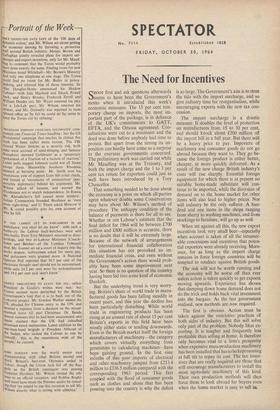The Need for Incentives
HOOT first and ask questions afterwards Oseems to have been the Government's motto when it introduced this week's economic measures. The 15 per cent tem- porary charge on imports, the most im- portant part of the package, is in defiance of the UK's commitments to GATT, EFTA, and the Ottawa agreement. Con- sultations were cut to a minimum and the deed was done before anybody had time to protest. But apart from the timing its im- position can hardly have come as a surprise to the overseas governments concerned. The preliminary work was carried out while Mr. Maudling was at the Treasury, and both the import charge and the 1 to 3 per cent tax rebate for exporters could just as well have been introduced by a Tory Chancellor.
That something needed to be done about the economy is a point on which all parties agree whatever doubts some Conservatives may have about Mr. Wilson's method of procedure. The unhappy condition of the balance of payments is there for all to see. Whether or not Labour's estimate that the final deficit for 1964 will be between £700 million and £800 million is accurate, there is no doubt that it will be extremely large. Because of the network of arrangements for international financial collaboration this situation has not provoked an im- mediate financial crisis, and even without the Government's action there would prob- ably have been some improvement next year. So there is no question of the country having been led into some kind of economic Dunkirk.
But the underlying trend is very worry- ing. Britain's share of world trade in manu- factured goods has been falling steadily in recent years, and this year the decline has been particularly disturbing. While world trade in engineering products • has been rising at an anuual rate of about 15 per cent Britain's exports in this field have been mostly either static or tending downwards. Even in the British market itself the foreign manufacturers of machinery—the category which covers virtually everything from generators to calculating machines—have been gaining ground. In the first nine months of this year imports of electrical and other machinery jumped from £253.4 million to £336.5 million compared with the corresponding 1963 period. This fact coupled with the flood of consumer goods such as clothes and shoes that has been pouring into the country is why the deficit is so large. The Government's aim is to stem the tide with the import surcharge, and so give industry time for reorganisation, while encouraging exports with the new tax con- cession.
The import surcharge is a drastic measure. It doubles the level of protection on manufactures from 15 to 30 per cent, and should knock about £200 million off the import bill in a full year. But there will be a heavy price to pay. Importers of machinery and consumer goods do not go abroad because they want to. They go be- cause the foreign product is either better, cheaper, or more quickly delivered. As a result of the new charge British industry's costs will rise sharply. Essential foreign equipment for which there is at present no suitable home-made substitute will con- tinue to be imported, while the diversion of demand on to the home market for; other items will also lead to higher prices. Nor will industry be the only sufferer. A hun- dred and one items in the shops ranging from sherry to washing machines, and from stockings to furniture, will go up as well.
When set against all this, the new export incentives look very small beer—especially when account is taken of all the innumer- able concessions and incentives that poten- tial exp'orters were already receiving. More- over, for as long as the import charge remains in force foreign countries will be tempted to retaliate against British goods.
The risk will not be worth running and the economy will be worse off than ever unless action is taken quickly to get exports moving upwards. Experience has shown that damping down home demand does not do the trick and holds back vital investment into the bargain. As the last government realised, new methods are now required.
The first is obvious. Action must be taken against the restrictive practices of both sides of industry. But this will solve only part of the problem. Nobody likes ex- porting. It is tougher and frequently less profitable than selling at home. It therefore only becomes vital to a firm's prosperity when expensive mass-production machinery has been installed that has to be kept running at full tilt to repay its cost. The tax incen- tives that are really required are those that will encourage manufacturers to install the most up-to-date machinery of this kind. Their own production methods will then force them to look abroad for buyers even when the home market is easy to sell in.


































 Previous page
Previous page